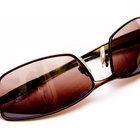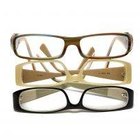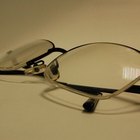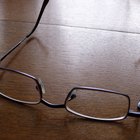
Prescription eyeglasses typically use lenses made of plastic, glass or polycarbonate. Polycarbonate lenses offer the benefit of safety and thinness but typically lack the optical clarity of regular plastic lenses. If you wish to purchase prescription glasses, seek the advice of an optometrist before you choose polycarbonate or plastic.
Refractive Index
Refractive index refers to the rate at which light bends as it passes through the plastic of the lens. The higher the refractive index, the thinner the glass. High-index plastic lenses have a refractive index between 1.6 and 1.74; the index of ordinary plastic and polycarbonate lenses is 1.5 and 1.59, respectively.
Width and Weight
Due to their higher index, polycarbonate lenses are thinner and lighter than traditional lenses. Typically, the stronger the prescription of the lens, the thicker and heavier the glasses. Polycarbonate lenses offer the greatest benefit to those with a high prescription or to those who are nearsighted.
UV Protection
Polycarbonate lenses offer 100 percent protection from UV light and radiation. Ordinary plastic lenses offer minimal protection from UV radiation. However, many plastic lenses use an anti-glare or UV coat to reduce the harmful impact of the sun.
Safety
Often, optometrists recommend polycarbonate lenses when safety is an issue. Polycarbonate lenses are 10 times more impact-resistant than ordinary plastic lenses. Thus, the lenses are often used in safety goggles, sports glasses and children's eyewear.
Cost
Though their specific cost varies, polycarbonate lenses almost always cost more than ordinary plastic lenses. The extra fee for polycarbonate lenses can be anywhere from $10 to $100.
Other Concerns
Plastic responds to tints, the darkness that turns glasses into sunglasses, while polycarbonate does not. Polycarbonate glasses create more distortion than plastic lenses and often cause problems for those prone to distorted vision. Further, plastic glasses scratch less frequently
Related Articles

Rimless vs. Full Rim Glasses

Polycarbonate Lenses Vs. Polarized

How to Fix Transition Lenses

How to Sterilize Eyeglasses

How to Clean Eyeglasses With Toothpaste

How to Clean Progressive Lenses

How Do I Repair Scratches on an Oakley ...

How to Remove Scratches From Safety ...

How to Spot Fake Serengeti Sunglasses

10 Facts About Eyeglasses

About Eyeglass Nose Pads

How to Remove Scratches From Plastic ...

How to Care for Transition Glasses

What Is Bio-Flex Made of for Piercings?

How to Use Armour Etch to Strip ...

How to Remove the Anti-Reflective ...

How to Change the Battery in a Cartier ...

How do I Size Oakley Sunglasses?

How to Polish Plastic Glasses

Tanning Beds and Eye Disorders
References
Writer Bio
Breann Kanobi has worked as freelance writer since 2010. Kanobi regularly submits content online to Gamer DNA. Kanobi received a Bachelor of Fine Arts in film and television from New York University in 2010.
Photo Credits
Jupiterimages/Comstock/Getty Images